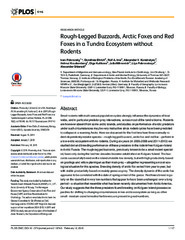Blar i forfatter "Kulikova, Olga"
-
Assessing the causes of breeding failure among the rough-legged buzzard (Buteo lagopus) during the nestling period
Pokrovskiy, Ivan; Ehrich, Dorothee; Ims, Rolf Anker; Kulikova, Olga; Lecomte, Nicolas; Yoccoz, Nigel (Journal article; Tidsskriftartikkel; Peer reviewed, 2012)When food becomes scarce, the youngest nestlings in facultatively siblicidal raptor species typically die and such events are usually attributed to siblicide. Here we present results from an investigation in the Arctic tundra, in which rough-legged buzzard (Buteo lagopus) breeding success was monitored with regular visits to nests and time-lapse cameras that continuously recorded the activity of ... -
Harmonizing circumpolar monitoring of Arctic fox: benefits, opportunities, challenges and recommendations
Berteaux, Dominique; Thierry, Anne-Mathilde; Alisauskas, Ray; Angerbjörn, Anders; Buchel, Eric; Doronina, Liliya; Ehrich, Dorothee; Eide, Nina Elisabeth; Erlandsson, Rasmus; Flagstad, Øystein; Fuglei, Eva; Gilg, Olivier; Golstman, Mikhail; Henttonen, Heikki; Ims, Rolf Anker; Killengreen, Siw Turid; Kondratyev, Alexander V.; Kruchenkova, Elena; Kruckenberg, Helmut; Kulikova, Olga; Landa, Arild Magne; Lang, Johannes; Menyushina, Irina; Mikhnevich, Julia; Niemimaa, Jukka; Norén, Karin; Ollila, Tuomo; Ovsyanikov, Nikita; Pokrovskaya, Liya; Pokrovsky, Ivan G.; Rodnikova, Anna Y.; Roth, James D.; Sabard, Brigitte; Samelius, Gustaf; Schmidt, Niels-Martin; Sittler, Benoit; Sokolov, Aleksandr A.; Sokolova, Natalya A.; Stickney, Alice; Unnsteinsdóttir, Ester Rut; White, Paula A. (Journal article; Tidsskriftartikkel; Peer reviewed, 2017-08-16)The biodiversity working group of the Arctic Council has developed pan-Arctic biodiversity monitoring plans to improve our ability to detect, understand and report on long-term change in Arctic biodiversity. The Arctic fox (Vulpes lagopus) was identified as a target of future monitoring because of its circumpolar distribution, ecological importance and reliance on Arctic ecosystems. We provide ... -
Improving dialogue among researchers, local and indigenous peoples and decision-makers to address issues of climate change in the North
Callaghan, Terry V.; Kulikova, Olga; Rakhmanova, Lidia; Topp-Jørgensen, Elmer; Labba, Niklas; Kuhmanen, Lars-Anders; Kirpotin, Sergey; Shaduyko, Olga; Burgess, Henry; Rautio, Arja; Hindshaw, Ruth S.; Golubyatnikov, Leonid L.; Marshall, Gareth J.; Lobanov, Andrey; Soromotin, Andrey; Sokolov, Alexander; Sokolova, Natalia; Filant, Praskovia; Johansson, Margareta (Journal article; Tidsskriftartikkel; Peer reviewed, 2019-11-12)The Circumpolar North has been changing rapidly within the last decades, and the socioeconomic systems of the Eurasian Arctic and Siberia in particular have displayed the most dramatic changes. Here, anthropogenic drivers of environmental change such as migration and industrialization are added to climateinduced changes in the natural environment such as permafrost thawing and increased frequency ... -
Nest association between two predators as a behavioral response to the low density of rodents
Pokrovsky, Ivan G.; Ehrich, Dorothee; Fufachev, Ivan A.; Ims, Rolf Anker; Kulikova, Olga; Sokolov, Aleksandr; Sokolova, Natalia; Sokolov, Vasiliy; Yoccoz, Nigel (Journal article; Tidsskriftartikkel; Peer reviewed, 2019-11-04)Many birds nest in association with aggressive birds of other species to benefit from their protection against predators. We hypothesized that the protective effect also could extend to foraging resources, whereby the resultant resource-enriched habitats near a nest of aggressive raptors could be an alternative cause of associations between nesting bird species with non-overlapping foraging niches. ... -
Rough-legged buzzards, arctic foxes and red foxes in a tundra ecosystem without rodents
Pokrovsky, Ivan; Ehrich, Dorothee; Ims, Rolf Anker; Kondratyev, Alexander V.; Kruckenberg, Helmut; Kulikova, Olga; Mihnevich, Julia; Shienok, Alexander (Journal article; Tidsskriftartikkel; Peer reviewed, 2015-02-18)Small rodents with multi-annual population cycles strongly influence the dynamics of food webs, and in particular predator-prey interactions, across most of the tundra biome. Rodents are however absent from some arctic islands, and studies on performance of arctic predators under such circumstances may be very instructive since rodent cycles have been predicted to collapse in a warming Arctic. ...


 English
English norsk
norsk



